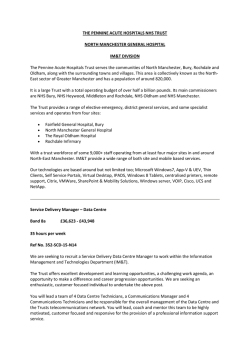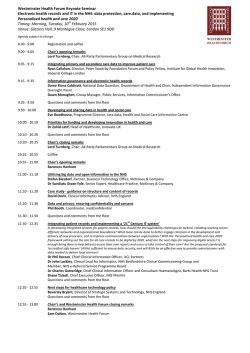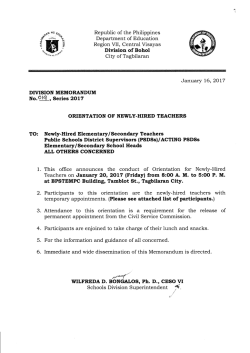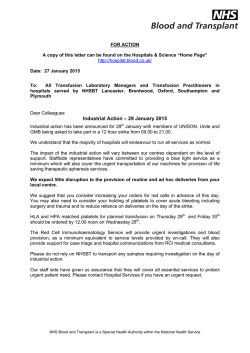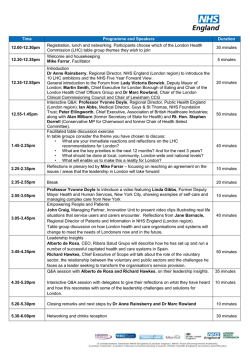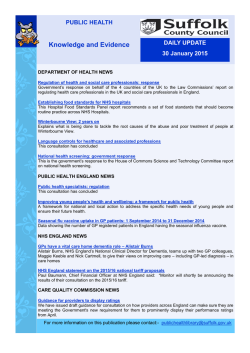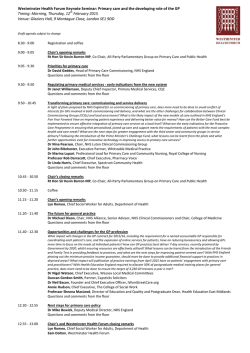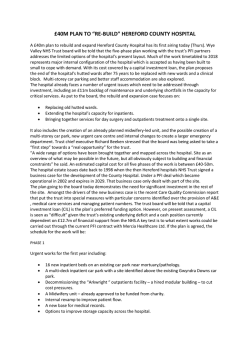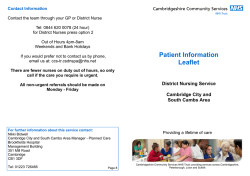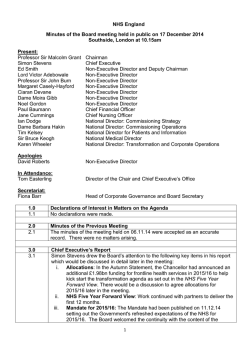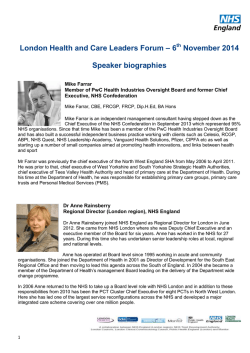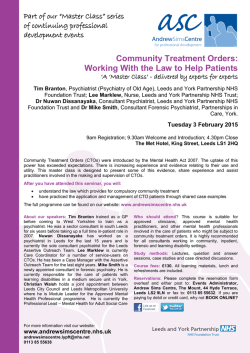
Paper PB29.01.15/01 BOARD PAPER
Paper PB29.01.15/01 BOARD PAPER - NHS ENGLAND Title: Chief Executive’s report By: Simon Stevens, CEO Purpose of paper: Update on the work of the Chief Executive over the last month Information on a number of NHS England priorities not covered elsewhere on the agenda. Actions required by Board Members: To note, and to discuss various items referred to herein. NHS England Chief Executive’s report January 2015 1. Higher demand for urgent and emergency care over the holiday period, combined with the de facto launch of the general election campaign means that 2015 has begun with an intense focus on the NHS and its future. This is neither unexpected, nor in many ways unwelcome - provided it generates better understanding of the immense hard work of NHS frontline staff, backed by meaningful support for the consensus-based agenda of improvement and investment set out in the NHS’ own Five Year Forward View. NHS performance 2. Urgent and emergency care. While performance on headline measures has improved over the past fortnight, the Christmas and New Year period was a time of immense pressure on ambulance, 111 and A&E services. Compared with the same period just a year ago, A&E attendances were up by almost 20,000 in just one week. Increases of 5%+ cannot wholly be explained by demographic pressures; they also imply changes in how patients are interacting with the health and social care system. 3. To take one illustration: the ratio of GP consultations to A&E attendances is around 16:1 (perhaps >370m versus >23m). So a tiny change in that ratio can produce a substantial increase in the numbers of people presenting in A&E. Similarly, small changes at the margin in the availability of social care, informal care, and community health services can produce high-impact effects downstream in the urgent and emergency care system. 4. This underlines the mission-critical nature of the NHS’ four-part agenda on urgent and emergency care over the next year and beyond: - - 5. Simplify and redesign the NHS’ urgent care ‘front door’ (A&E, 111, 999, ambulance services, GP out of hours, urgent care centres etc) Invest in safe staffing, new roles, and recruitment and retention, including for primary care, paramedics, A&E doctors, and senior nurses. Better care coordination between community, social care, care homes, primary care and hospital services, particularly for older people at risk of hospitalisation Continuing best practice improvements in internal clinical and operational processes within hospitals Elective care. As the financial year draws to a close, we also want to ensure that patients needing routine surgery are able to benefit from the extra £250 million made available to hospitals since last summer. NHS TDA and Monitor are now working with all hospitals which are breaching the NHS Constitution 18 week waiting standard to ensure they contact all relevant patients to discuss options for accelerated treatment. 2 NHS England’s role leading service improvement 6. Since the last Board meeting we have set in train actions to support concrete improvements in some high priority service areas. 7. Primary care. The NHS Five Year Forward View made a commitment to a ‘new deal’ for general practice. In the past fortnight we have announced two important initiatives which start to make this a reality. First, NHS England and Health Education England, together with the Royal College of GPs and the BMA General Practitioners Committee (GPC), have jointly produced a ten point action plan to address immediate primary care workforce issues and to take steps in building the workforce for the future models of care. Work will focus on programmes linked to ‘the three Rs’: recruitment; retention, and returners. Second, following the Chancellor’s Autumn Statement in December, we have now invited GPs across the country to submit bids to improve their premises. £250m is available for each of the next four years. In the first year it is anticipated that the money will predominantly accelerate schemes which are in the pipeline, bringing benefits to patients more quickly. 8. Cancer services. I’ve asked Harpal Kumar, chief executive of Cancer Research UK to chair a new multi-stakeholder cancer taskforce to develop options for comprehensive improvement in cancer prevention, diagnosis, treatment and care, fleshing out the headline commitments made in the Five Year Forward View. In parallel we have announced new investment in modern radiotherapy services, and a series of innovative pilots across England to speed up cancer diagnosis and one year survival rates. 9. Mental health. Work continues to prepare for the introduction of the first waiting times standards for mental health services from April, as well as a substantial expansion in the availability of ‘talking therapies’. CCGs are also for the first time being asked to ensure real terms growth in mental health investment in each part of the country, at least as great as their overall growth for 2015/16. 10. Specialised services. As agreed at the last Board meeting we have now launched a consultation paper on priority setting in specialised services. Arrangements for co-commissioning with CCGs are also developing well, alongside proper safeguards to ensure consistency of national standards. Having listened carefully to consultation responses on further devolution from April, we intend to defer beyond 2015/16 consideration of the transfer of responsibilities to CCGs for renal and weight loss services. Five Year Forward View 11. Work continues apace on scoping implementation of key elements of the Forward View. A number of these activities are covered elsewhere on today’s Board agenda. We have now formed a FYFV leadership board of the chief executives of the six NHS organisations that co-authored the Forward View. 3 We also hosted an event on new care models for frontline NHS organisations and our partners with Don Berwick last Friday. NHS partners interested in working with us on this will express interest by 9 February, which will form the basis of our decisions about the use of the £200 million Transformation Fund in 2015/16. External engagements 12. I’ve continued to visit NHS services over the month and half since our last Board meeting. These include GPs in Sheffield, the Yorkshire AHSN, Cambridge University Hospitals, West Berkshire Community Hospital, Jubilee Street GP practice in East London, and the CCGs for Tower Hamlets and Southwark, as well as London Ambulance Service. Earlier this month I gave evidence on cancer services to the Public Accounts Committee, and have given speeches to the All Party Parliamentary Group on Health, to chairs of NHS providers at the HFMA, to an NHS IQ group discussing diversity and thought diversity, to mid-career leaders under the aegis of the NHS Leadership Academy, and young doctors at Barts medical school. Simon Stevens January 2015 4
© Copyright 2026
